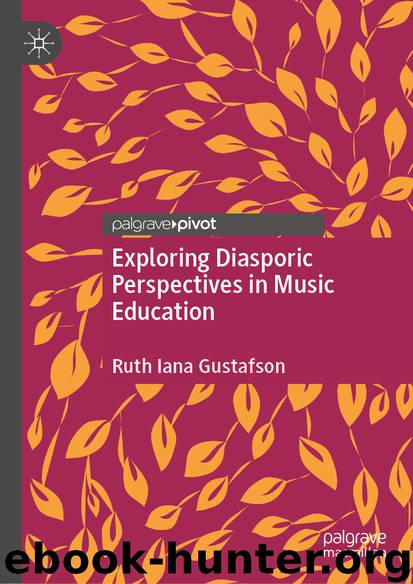Exploring Diasporic Perspectives in Music Education by Ruth Iana Gustafson

Author:Ruth Iana Gustafson
Language: eng
Format: epub
ISBN: 9783030521059
Publisher: Springer International Publishing
Research on music of the pre-Civil War era, however, allows us to filter the picture of slave music in Lortie’s text through representations of blacks as content in bondage, living out the destiny of their “natural” musical capacities. Historical commentary on slave songs reveals that accounts of its existence are absent and that commentary on slave songs went through a period of silence. Testimony of the performance of slave songs was rare.
In Lortie’s fictional scene, “Juba” is folklore, but evidence of a black/white shared musical space, according to what is now known about an affinity between Irish and black workers in the early nineteenth century would imply an integrated social environment in which the fast-moving, complicated rhythm of dances performed to “Juba” (viewable on the Internet today) appear. These dance steps are reconstructed from accounts of social dancing in the eighteenth century and the minstrel tradition, in which jig-like dancing emerged from interchanges between Irish immigrants and African Americans who labored together on the wharves of Baltimore, New York City, and Boston. Informal social encounters blended the steps of the Irish jig with West African dance motifs which some scholars refer to as remnants of culture surviving the Atlantic crossings of both the Irish and Africans. “Da yellow cat,” a phrase that is typically in the first verse of “Juba,” refers to violence against white slave owners occurring in slave rebellions, possibly in the nineteenth century or earlier. Thus, there is a mingling of two traditions in “Juba”: the dance movements of a jig and the coded lyrics that reach back to the repressed history of the Atlantic diasporas. In the Music Appreciation text of 1962 by Lortie, “Juba” represents a “blackening” of a creolized form. Nonetheless, it gestures toward the revelation of spaces shared by whites and blacks that have been obscured and emotionally contested as to racial origins (Radano 2003: 328n18, 375n106; Womack 2012).
“Juba Juba” and other so-called Negro songs popular in the 1800s had a prominent role in the rise of a vocation for white entertainers as minstrels. Eric Lott’s Love and Theft: Blackface, Minstrelsy, and the American Working Class describes audiences’ preference for whites in blackface in place of black entertainers as a complex effect of the subjugation of black subjects. Several factors—the economic threat of black labor replacing whites, fear of black women, and the projections of homosexuality through the feminization of black men on stage contributed to the popularity of white men in blackface. Accounts of a “first” performances of minstrelsy places this genre in the years between 1828 and 1832 when T. D. Rice, purportedly “white,” as the story goes, put on blackface and borrowed a black laborer’s work clothes to sing “Jump Jim Crow.” This event reportedly took place in a New York City theatre. In 1840, a man dubbed “Master Juba,” white, but painted in blackface, William Henry Lane, imitated fictional minstrels whose choreography combined and transformed dance steps of slave and Irish immigrants (1995: 152–155).
The silence falling over the blended,
Download
This site does not store any files on its server. We only index and link to content provided by other sites. Please contact the content providers to delete copyright contents if any and email us, we'll remove relevant links or contents immediately.
The Goal (Off-Campus #4) by Elle Kennedy(13657)
Kathy Andrews Collection by Kathy Andrews(11812)
Diary of a Player by Brad Paisley(7559)
Assassin’s Fate by Robin Hobb(6199)
What Does This Button Do? by Bruce Dickinson(6195)
Big Little Lies by Liane Moriarty(5790)
Altered Sensations by David Pantalony(5093)
Pale Blue Dot by Carl Sagan(4996)
Sticky Fingers by Joe Hagan(4188)
The Death of the Heart by Elizabeth Bowen(3610)
The Heroin Diaries by Nikki Sixx(3543)
Confessions of a Video Vixen by Karrine Steffans(3301)
Beneath These Shadows by Meghan March(3300)
How Music Works by David Byrne(3259)
The Help by Kathryn Stockett(3139)
Jam by Jam (epub)(3073)
Harry Potter 4 - Harry Potter and The Goblet of Fire by J.K.Rowling(3060)
Computational Linguistics and Intelligent Text Processing: 20th International Conference, CICLing 2019 La Rochelle, France, April 7â13, 2019 Revised Selected Papers, Part I by Alexander Gelbukh(2985)
Strange Fascination: David Bowie: The Definitive Story by David Buckley(2862)
